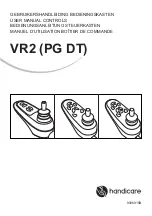
Sequence of operation
VVT Zone II Controller
CARRIER CORPORATION ©2019
Installation and Start-up Guide
All rights reserved
47
Zone airflow control
The VVT Zone II provides pressure-dependent zone temperature control by modulating its built-in damper actuator
to control the flow of primary air into the zone. The controller uses PID control to calculate the damper position
based on the difference between the zone’s temperature and setpoints.
The air source mode determines if the primary air can meet the zone’s need. If the zone controller is in a linked
system, the air source mode is determined by the air source. If the zone controller is stand-alone or if linkage
communication fails, the mode is determined by the controller's SAT. See
Air source mode determination
(page
54). If the air source mode is the same as the zone’s local mode, the damper is positioned between the mode’s
configurable minimum and maximum damper position. If not, the damper is positioned at the mode's minimum
damper position to insure sufficient minimum airflow at the air source.
When the air source mode is Vent and the zone’s temperature demand is satisfied, the damper moves to its
Vent
Position
to increase airflow and ventilation to the space.
Single duct with reheat
– The
Reheat Min Damper Position
allows an increase of primary airflow across the
terminal’s ducted heating coil when the terminal is operating its local heat while the air source mode is Cool. This
provides the ability to lower the cooling minimum airflow limits while providing the necessary airflow when the
terminal is heating to ensure design load conditions and electric heater minimum airflow.
Parallel fan terminals
– The controller's
Parallel Fan On Value
determines when the fan turns on to increase
airflow at the zone’s diffusers and prevent cold air from dumping into the zone when the system mode is Cool.
This is achieved by increasing the volume and temperature of the air exiting the diffusers. Should the zone’s
damper close below the
Parallel Fan On Value
, the parallel fan is energized to mix ceiling plenum air with the
primary air to increase total airflow and ventilation to the zone. The fan turns off when the damper position opens
to 1% above the setpoint.
The fan also starts in Heat mode if the zone is configured for ducted heat as described in
Zone reheat control
(page 48).
Series fan terminals
– The fan energizes when the air source fan is on if the zone controller is part of a linked
system or in the unoccupied heat mode and the equipment fan is off. If the zone controller is stand-alone, the fan
runs continuously. There is a fan start delay on transition to occupied, based on the
Power Fail Start Delay
. Before
the fan starts, the damper closes. The damper position must be less than 5% for 10 seconds before the fan starts
to prevent the fan from starting backwards.
See
Appendix B: VVT terminal modes
(page 92).
Damper Actuator(s)
– The VVT Zone II's built-in 35 in/lb (4 Nm) actuator has a 205 second full travel time for 90°
operation. For field retrofit applications, the actuator can be adjusted for a damper stroke between 30° and 90°,
and it can be configured to move clockwise (default) or counterclockwise.
If the built-in actuator's torque is insufficient for large damper applications, the VVT Zone II's analog output can
drive an external, 0-10 volt, high-torque actuator. Or, the controller can drive one or more additional slave
actuators. A slave actuator must be mounted and configured to fully close the damper when the output signal is 0
volts. See
Wiring field-supplied actuators to the analog output.
(page 37)
Summary of Contents for VVT Zone
Page 103: ......
















































